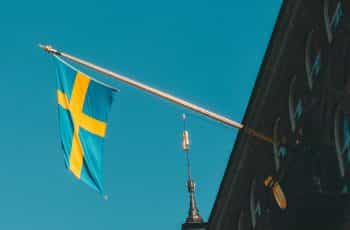Gambling Market Grows in Lithuania
In the first nine months of 2023, ending on September 30, the gambling sector of Lithuania propelled its revenue by a total of 15 percent year-on-year (YoY) to €161 million. Compared to the same period last year, where revenue stood at €127 million, marked growth has been attributed to increased activity across land-based and online markets. With a growth of over €34 million compared to last year, revenue was mostly driven by remote gambling followed by land-based outlets. Among the online games, slots contributed to nearly 50 percent of the overall Gross Gambling Revenue (GGR) recorded for the period.

Lithuania’s GGR has been on the rise since the first quarter of this 2023.
©Victor Malyushev/Unsplash
Lithuania’s GGR has been on the uptick since the first quarter of this year when the gambling regulatory and supervisory authority of Lithuania recorded a 26 percent YoY increase compared to the same period in the previous year. The quarterly revenue of the first three months of the year had increased to €55.3 million, compared to €43.9 million from the corresponding quarter of the previous year. The GGR recorded for 2022-23 stood at €195.8 million. Based on the current trends, Lithuania is on track to exceed this amount by the conclusion of the current fiscal year.
The growth rate experienced by Lithuania’s gambling sector remained consistent through 2022. At the halfway mark, results indicated a 21.5 percent YoY increase compared to the corresponding period of 2022. Gross gambling revenue at the end of H1 stood at €108.5 million. Most of this growth was driven by the online gambling sector, contributing to 66.5 percent of the GGR. While the land-based gambling segment also showed signs of growth, it moved at a comparatively slower pace. Additionally, lottery ticket distribution was up by 4.4 percent in H1 2023, supplemented by a 3.1 percent reduction in the payout of winnings.
The legal gambling market in Lithuania is carried by 12 active, licensed operators across different segments. While gambling was legalized in 1992, only lotteries were allowed to operate until 2001. That year, the Gaming Law of the Republic of Lithuania came into effect, effectively allowing and regulating the operation of other forms of gambling in the country. The passing of this law also led to the formation of the Lithuanian Gambling Authority as the highest regulatory authority of gambling in Lithuania. In 2022, amendments to the Gambling Law and Lottery and Gaming Tax were approved, resulting in the introduction of a new category of licenses for remote gambling services. Shortly after, virtual slot machines became the most popular choice for Lithuanian players, while online casinos are slowly gaining a foothold in the surging online gambling market. After virtual slots, online sports betting is the second most popular segment.
In its half-yearly report, the Lithuanian Gambling Authority revealed that the combined revenue of the first and second quarters of 20-23 is 21.5 percent higher than the same period in 2022. Only ten land-based and nine licensed gambling operators are active in the tightly regulated Lithuanian market. Despite the higher number of land-based operators, GGR from physical outlets remained considerably lower than the revenue generated by online platforms. The total revenue generated in H1 2023 stood at €108.5 million, out of which €72.2 million was generated by remote gambling platforms. The remaining €36.3 million was generated by land-based gambling. The increase in growth amounted to 31 percent when compared to H1 2022. In the previous year, iGaming revenue was only €17.3 million, indicating a strong upward trend for the growth of Lithuania’s legal gambling market.
Online Slots Games Drive Revenue Growth
The growth phase of Lithuania’s GGR has continued well into Q3 2023. During the recently concluded quarter, category A slots games have been the highest revenue drivers drivers, generating more than €69.5 million in GGR, comprising 33.7 percent of the total. The GGR generated by Category B slots increased by 18.2 percent to €2.6m. The total GGR from slots amounted to €72.1 million. The growth in slots revenue has been significant enough to offset a shrinkage in online sports betting revenue, which fell by 1.1 percent to €2.61 million. Conversely, the revenue from table games saw a steep increase, jumping by 63 percent to €8.8 million.
Lithuanian Gambling Authority Continues to Crack Down on Irregularities
Earlier this year, the Lithuanian Gambling Authority came down heavily on online sports betting operators Top Sport. An investigation revealed that the platform had granted gambling access to a self-excluded person. In 2022, Lithuania officially recognized a register of self-exclusion from all forms of gambling. With clear laws to support players who may be at risk of problem gambling, the Lithuanian Gambling Authority issued a fine of €25,000 on Top Sport. This instance is just one of many violations committed by Top Sport in 2023 – the operator has been fined nine times in 2023 so far.
Earlier in 2023, an improper CCTV camera installation at one of its slot machine salons led to a string of fines for the operator. Its failure to properly save recordings from a gambling center further exacerbated the punishment passed on by The Lithuanian Gambling Authority. Top Sport was also fined €25,000 for admitting a minor in one of its slot machine salons, €15,000 for an application error that caused placed bets to be repeated, and another €15,000 for accepting additional deposits via a third-party account. In all, Top Sport has had to pay fines of €135,000 in 2023.
The close eye that the Lithuanian Gambling Authority maintains has seen operators under its jurisdiction make improvements to their operational practices. Amber Gaming was fined €6,000 in February 2023 for sending password reset emails that contained links to the company website. As all promotional activity is prohibited in Lithuania, Amber Gaming had to pay the fine and correct its processes. Amber Gaming was also accused of limiting bets without offering valid reasons, for which it had to pay a €15,000 fine.



